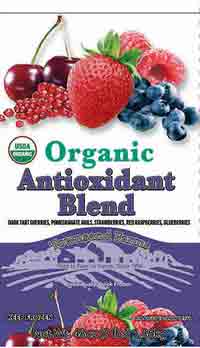A huge outbreak of hepatitis A linked to pomegranate seeds in Townsend Farms Organic Antioxidant blend sickened 165 people in 10 states in 2013. Seventy-one people were hospitalized in this outbreak and several recalls were issued. The FDA also investigated this outbreak.
 The case count by state was as follows: Arizona (24), California (80), Colorado (29), Hawaii (8), New Hampshire (1), New Jersey (1), New Mexico (11), Nevada (6), Utah (3), and Wisconsin (2). Fifty-five percent of ill persons were female. The age range was from less than one year to 84 years. Illness onset dates ranged from 3/31/2013 – 8/12/2013. Forty-two percent of all ill persons were hospitalized. No deaths were reported. All people who reported eating this product before they became ill purchased it from Costco markets, but the product was also sold at Harris Teeter stores. It was determined that the pomegranate seeds in the frozen fruit blend were imported from Goknur, Turkey because the genotype of hepatitis in this outbreak is rarely seen in the American continent.
The case count by state was as follows: Arizona (24), California (80), Colorado (29), Hawaii (8), New Hampshire (1), New Jersey (1), New Mexico (11), Nevada (6), Utah (3), and Wisconsin (2). Fifty-five percent of ill persons were female. The age range was from less than one year to 84 years. Illness onset dates ranged from 3/31/2013 – 8/12/2013. Forty-two percent of all ill persons were hospitalized. No deaths were reported. All people who reported eating this product before they became ill purchased it from Costco markets, but the product was also sold at Harris Teeter stores. It was determined that the pomegranate seeds in the frozen fruit blend were imported from Goknur, Turkey because the genotype of hepatitis in this outbreak is rarely seen in the American continent.
There were three recalls of this product, on June 4, 2013 for Townsend Farms Organic Antioxidant Blend, June 28, 2013 for an expansion of the original recall, and June 26, 2013 for Woodstock Frozen Organic Pomegranate Kernels produced by Scenic Fruit Company. It’s possible that consumers still have these items in their freezers. Look at the recall information carefully and check your freezer. If you have any of the recalled products, discard them immediately.
The outbreak was originally discovered when Jackson County, Oregon health officials thought that customers were exposed to hepatitis A in that facility’s smoothie. Five days later, a warning was issued by the Mendocino County Public Health Department. Traceback and trace forward investigations determined that the “most likely vehicle” for the virus was a common shipment of pomegranate seeds from Goknur used by Townsend Farms and Scenic Fruit Company.
The symptoms of hepatitis A are caused by the hepatitis A virus. The disease is highly contagious and can be serious for those with liver problems. The symptoms begin within 15 to 50 days after exposure and include fatigue, abdominal pain, loss of appetite, jaundice, nausea, diarrhea, abnormal liver tests, pale clay-colored stool, and dark urine.




